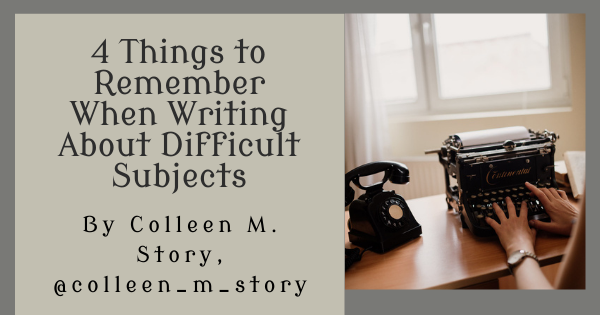by Colleen M. Story, @colleen_m_story
Difficult subjects.
We’d all rather avoid them. It’s easier to write about good things happening to our characters. Falling in love. Getting a new job. Striking out on an adventure.
But physical or sexual abuse? Assault? Addiction? Suicide?
That’s where we can get a little squeamish.
Yet when the muse says you need to write about these difficult topics, you must honor the muse!
How to manage it? Keep the following four things in mind.
When Writing About Difficult Subjects: Show Empathy
When writing about difficult topics like abuse or assault, it can be tough to find empathy for the perpetrator. Particularly if you have personal experience as a victim, it can be satisfying to portray your perpetrator as completely evil, and then to dole out the justice he or she deserves.
Perhaps justice that was sorely lacking in your life.
There’s nothing wrong with doing this on a practice story, in your journal, or even in the first draft of your novel. But it’s important to remember that if you want to create a publishable story that readers will enjoy, you have to accurately portray all of your characters, even the ones you may dislike.
My next novel coming out, The Beached Ones, explores a couple of difficult topics. One is verbal abuse between a parent and a child. At first, my parent character was rather one-dimensional, with the reader seeing her only through the child’s eyes.
Later, I realized that no matter how dysfunctional, this relationship was important in my hero’s journey and needed further exploration. That required digging into the parent’s past a little more, realizing what had made her who she was, and doing my best to put myself in her shoes.
This took time, and it wasn’t until the later drafts that I succeeded, but I was much happier with the story when I did. It felt more authentic, and the hero’s journey much deeper and more satisfying.
This doesn’t mean you have to let your perpetrator off the hook. Finding true justice in your story can be healing to you personally, and will likely appeal to readers’ sense of justice as well. Allow your bad guy’s fate to play out as it will in your plotline. Just be sure that he or she is a full-fledged, well-rounded character just like the rest of your main characters.
When Writing About Difficult Subjects: Trust Your Muse
It’s funny how writing works. You’ll be working away on a story you think is about one thing, when all of a sudden something else will pop up.
If that something else happens to be a difficult subject, most times, it’s best to trust the muse and see where it goes.
Usually, if this comes up in the course of your writing without you thinking too much about it, it means you’re probably ready to address this topic. That’s a good sign, as it suggests that you may have gained enough distance from it that you can now handle it well within the confines of your story’s world.
That’s what happened to me. Another topic that my novel explores is suicide. I didn’t intend to write about this topic. I hadn’t thought about the suicide that occurred when I was young for many years.
But here I was writing about characters who had been touched by suicide in one way or another. I trusted the muse and went with it, and now I’m really glad I did. You too may find that an old trauma rears its ugly head in your writing. Trust yourself—if you feel ready to write about it, don’t let anything stop you.
When Writing About Difficult Subjects: Face Your Fear
Writing about difficult subjects can be frightening.
I worried that no publisher would want to touch a story that explored the subject of suicide. (I was wrong.) I worried what people might think of the story or the fact that I’d had a personal experience with suicide, which I knew I’d need to reveal eventually.
When a difficult subject comes up in your story, you too may worry about writing it. What will other people think? Will you be able to do justice to the topic?
Fear can come up in the writing, too. As you’re writing your scenes, you may notice old feelings reappearing, memories coming forward, and questions re-emerging about everything that may have happened in your life.
It can be difficult to stay with it sometimes, considering that to write a successful novel, you usually need to create multiple drafts.
This is why it can help to have some distance from any traumatic experience before you try to write a story that deals with a similar subject. But if the muse is telling you that this is the story you must write, do your best to face your fear and move forward. Usually, it’s the only way to keep growing as a writer.
When Writing About Difficult Subjects: Separate Experience from Story
Sometimes writers want to write about what happened to them just as it happened. Then when an editor or mentor tries to point out the flaws in the story, they’ll say, “But that’s how it happened!”
If you find yourself doing this, consider that you’re still too close to the experience to turn it into a story. You need more distance.
A story requires structure, pacing, characterization, rising and falling action, and all the rest. If you try to force a difficult topic onto your characters simply because it’s a topic that’s bothering you, personally, that probably won’t work very well.
Consider journaling about it first. See where it takes you. Journaling can help you get the story out, process your emotions, and ease you into a place where you can better see all sides of the story—which is what you need to do as a writer.
Remember your reader: He or she is coming to you for entertainment, first and foremost. For you, the story may be a way to overcome the trauma. But for a reader, it needs to be an enjoyable way to pass the time. Think of your reader before you commit to creating a story.
A Final Thought on Writing About Difficult Topics
My editor for The Beached Ones once told me that she thought the book had a lot of empathy, as well as an “uplifting” ending. I loved hearing that, as I wanted to give my readers hope.
We all go through difficult experiences in life. If we’re not careful, they can bring us down so low that we have a hard time picking ourselves back up.
The right book can help. You probably already know an author who helped you cope with a difficult experience. Imagine being able to be that author for someone else.
Not that everything has to be wine and roses for your character in the end. But to form a complete arc, your character will need to find a way to move on.
What’s amazing about writing is that this can help you move on too. Even if the story is completely different from what you may have experienced. If it explores a similar topic, you may be amazed at how following your character’s journey can help both of you emerge as stronger, more resilient people.
The Beached Ones did that for me, and I’ll be forever grateful.
Note: The Beached Ones is forthcoming from CamCat books in June 2022. Get your FREE excerpt here, or preorder now! (Buy links and book trailer here.) Get FREE chapters of Colleen’s books for writers here.
 Colleen M. Story is a novelist, freelance writer, writing coach, and speaker with over 20 years in the creative writing industry. Her latest release, The Beached Ones, is forthcoming from CamCat Books in June 2022. Her novel, Loreena’s Gift, was a Foreword Reviews’ INDIES Book of the Year Awards winner, among others.
Colleen M. Story is a novelist, freelance writer, writing coach, and speaker with over 20 years in the creative writing industry. Her latest release, The Beached Ones, is forthcoming from CamCat Books in June 2022. Her novel, Loreena’s Gift, was a Foreword Reviews’ INDIES Book of the Year Awards winner, among others.
Colleen has written three books to help writers succeed. Your Writing Matters is the most recent, and was a bronze medal winner in the Reader Views Literary Awards (2022). Other award-winning titles include Writer Get Noticed! and Overwhelmed Writer Rescue. Enjoy free chapters of these books here.
Find more at her author website (colleenmstory.com) or connect with her on Twitter (@colleen_m_story) and LinkedIn.
4 Things to Remember When Writing About Difficult Subjects (by @colleen_m_story ): Click To Tweet
Photo credit: shixart1985 on Visualhunt.com


I’ve never written about the tough subjects (I’ve not been through most of them so they just don’t ping my radar). But certainly there are two sides to every story, even in horrible situations, and both sides need to be heard and contain depth.
One month until release, Colleen!
On the home stretch, Alex! Thanks for your support! :O)
Thanks so much for this great post, Colleen! I particularly like the idea for journaling about the subject first…getting your feet wet and figuring out how to address the issue further.
Thanks, Elizabeth, and thanks for sharing it here. :O) Yeah I think that works particularly if you’re still close to it yourself. It can help you determine if you’re ready to work on a publishable story or not.
Great tips on how to write about difficult topics. You’re right that the right book can help sometimes when you’re going through challenging times.
Thanks, Natalie. Yes, I’ve sure found that to be true!
This is all really useful advice, for which thanks. It is really hard to write about those wrenching subjects, and it’s good to have ways to think about it that allow the story to be told.
Thanks, Margot. Yes, it can be tough, but as with all types of writing, it always seems to be worth it!
Very good advice, for which I thank you. It is one thing for an author to struggle with the difficult subjects and how to approach them, but it is another entirely to do it while facing ill-informed opinions from other people. My advice would be to not tell anyone about the subjects you’re writing about unless you are completely and utterly sure the person/people you tell will not jump to conclusions even before you complete the project. As me how I know this.
Good advice, Sam, and sounds like you have experience with it. I’ve found that to be a good way to proceed no matter what you’re writing about. Otherwise the opinions of others can sway you too early in the creative process. Good luck with your project!